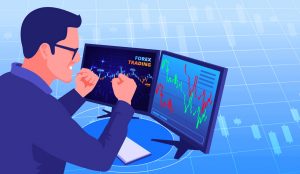Disclosure: Privacy Australia is community-supported. We may earn a commission when you buy a VPN through one of our links. Learn more.
What Is Forex Trading?

Were you aware that there’s an entire world of investment and trading, that makes trillions of dollars ever year? It’s true, with one type of exchange reaching $6.6 trillion in daily trading in 2019 alone.
And yet, despite it being so successful, there are many people who have never even heard of this type of market and the trades that go on in it.
The market is called forex and it’s full of possibility, with an enormous amount of money flowing through it. No matter where you live or what type of currency you use, you can invest in the forex market and find ways to increase your bottom line.
The forex market has become the largest financial market in the entire world. That $6.6 trillion mentioned above is an amazing amount when you consider that the forex market has grown from only $5 trillion just a few years ago.
With so much money floating around in forex, you can assume that there is some waiting for you. And you’re right, there’s certainly the chance of receiving a huge financial windfall if you play your cards right.
But what is the right way to approach forex? What are the biggest mistakes people make with it and how do you avoid them? How do you turn the forex market into your next big financial adventure which boosts your investment portfolio?
Table of Contents:
What Is Forex? 💱️
What happens when you combine the words “foreign currency” and “exchange”? You get “forex” of course. Forex is the process of exchanging one type of currency for another.
Why do people change one currency to another? There are plenty of reasons why. Usually, it has to do with commerce or trading.
Some people invest in the forex market because they intend to do a lot of business in another country. For example, if you are a huge wine fan and want to buy only the best bottles from France, you’ll want to have a good amount of French currency.
Every single day, all over the world, hundreds of currencies rise and fall in value related to one another. Just like any other type of market, savvy investors can turn a profit if they invest in these currencies at the right time.
Because the forex market exists all over the world, it operates 24/7, which is different from most markets in the globe. From Australia to China, Russia to Canada, the United States to Japan and beyond, there are so many different currencies that are offered on the forex market.
How Does Forex Trading Work? 📊️

As you would imagine, forex trading is a lot like buying and selling any other commodity in other markets, such as securities. However, the major distinction here is that forex trading is always done in pairs, which makes sense since it’s an exchange from one currency to another.
For example, you may be trading Euros for US dollars (EUR to USD), or you could be exchanging the Yen for the British pound (JPY to GBP). You are using one currency to buy another and you make your profit when the currency you just bought moves up and gains value against the currency you used to buy it.
For example, the US dollar might be worth 1.5 Australian dollars, meaning you could spend 1500 Australian dollars to buy 1000 US dollars. If the value of the US dollar then rises to 1.75 Australian dollars, you can sell your 1000 US dollars for 1750 Australian dollars – getting back more than you paid in the first place and making yourself a tidy 250 Australian dollar profit.
And What is the Forex Market? 🔎️
Of course, any type of exchange needs to be done on a market. In this case, forex trading is done via the forex market, which is huge, unwieldy, complicated and quite confusing for newcomers. That is why people who haven’t done much trading before need to really understand the forex market before they make their first exchange.
The thing that makes the forex market so interesting – and exciting – compared to other markets is that there is no central headquarters for it and not one marketplace. Instead, all trading on the forex market is done electronically, which means that every exchange is done through computers and network that connects traders all over the world.
Over the years, the forex market has grown larger and nd robust. Today, currencies are traded across the worlf from the financial centres of cities like Paris, Singapore, Tokyo, Zurich, New York, Hong Kong, and more.
Since each location operates in a different time zone, you can check into the forex market at any hour of the day and find a bustling centre of activity. It’s just as busty at 2 AM as it is at 2 PM, or really any time of day.
There are three primary markets through which people trade on the forex. It is important to know about all of them and what sets them apart, to decide which is right for you.
Spot Market
The spot market has always been the biggest of all the forex avenues to trade. Prices on the spot market are all dictated by basic supply and demand. They are influenced by a wide range of factors, like interest rates in different countries, the performance of economies, political situations, current events, and the perception and beliefs of traders.
In a spot market, a finalised deal and exchange is known as a spot deal. The selling party will give the agreed-upon currency and amount to the buying party. Upon the closure of the position, the settlement is given. Typically, a spot deal takes about two days to complete and be settled.
Futures Market
As you would assume, a future market is where future contracts are created and sold based upon an agreement between two parties who agree to exchange the currencies at a future date for a settled price.
These future contracts have specific details that are hammered out by both sides, including how many units are being traded, the date of delivery and the date of settlement. The market will act as a counterparty in this case and will provide the trader and buyer with clearance and settlement services.
Forwards Market
A forwards market is made up of forwards contracts, which are agreements made in private between two parties for a future date and an agreed-upon price listed in the over-the-counter, electronic marketplace. While the futures market is an exchange-traded market, the forward market is an OTC market.
Types Of Forex Trading ➡️
There are multiple ways that people invest in the forex market, some are long and some are short. Some are complicated and some are very simple.
The type of trading that you want to do will depend on the amount of money you want to invest, the profit you want to make, the time you want to spend, and the amount of energy you want to expel.
Of course, like in all markets, you can employ a long trade method when investing in forex. This is when you assume that the currency price will go up in the future and you will be able to make a profit from it.
Conversely, you can always do a short trade, thinking that the price of the currency will actually decrease in the future. You can use technical analysis, business news stories, and professional advice from brokers to determine your strategy as well.
There are other ways for you to trade.
Scalp Trade
A common tactic when exploring the forex market is to do a scalp trade. Here, you would hold your position for a very short amount of time, sometimes only seconds or minutes. By moving fast, you make a small profit when your currency value goes up.
By doing many scalp trades during the day, you can end up with a sizable amount of profit.
Day Trades
A day trade is another short-term trade when a position is held and then sold within the same business day. This can take minutes or up to hours. Again, like scalp trades, a day trade is about many small gains which accumulate throughout the day.
Position Trade
A position trade is yet another smart approach to the forex market. With it, the trader holds the currency for a longer amount of time, usually months or even years. Obviously, a trade like this means that you really understand the market, study it often, and have a deep analytical mind that allows you to hold or sell with confidence.
Swing Trade
With a swing trade, the trader holds onto the position for longer than a day, but not as long as they do in a position trade. Generally, the position is held for days or weeks.
Because they are longer than day trades, you don’t have to keep as close an eye on the market when you are swing trading. This is more ideal for people who don’t want to be tuned into the market all day long.
You Might Also Like:






